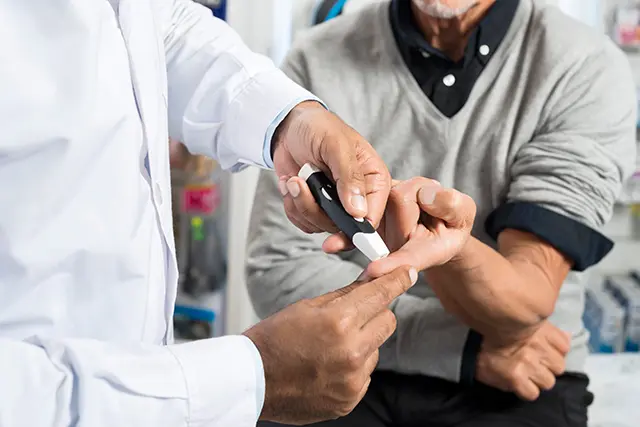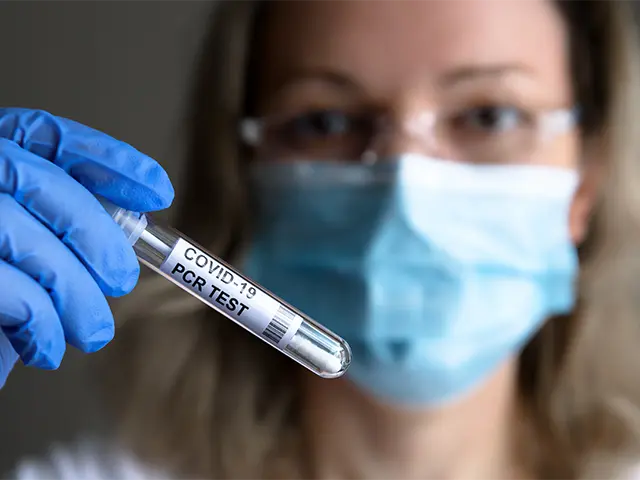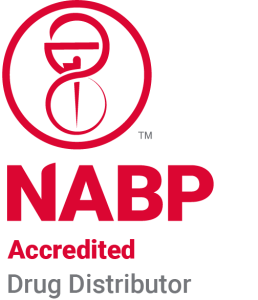Point-of-Care Testing
Unlock growth for your pharmacy by partnering with IPC and embracing a Point of Care Testing program. Contact us today to learn more and take the next step toward a stronger, more impactful pharmacy experience.



What is Point of Care Testing (POCT)?
Point-of-Care (POCT) testing refers to diagnostic tests conducted at or near the site of patient care, allowing for immediate results. These tests are conducted within the pharmacy setting, making use of pharmacy staff and resources. The most common tests include blood glucose monitoring, A1C, INR, cholesterol screening, RSV, flu A and B, strep, and COVID-19 tests.
Connect with IPC
Unlock growth for your pharmacy by partnering with IPC and embracing a Point of Care Testing program. Contact us today to learn more and take the next step toward a stronger, more impactful pharmacy experience.
Why should you offer Point-of-Care Testing in your pharmacy?
- Offering point of care testing in your pharmacy expands clinical service offerings and increases your pharmacy’s annual revenue.
- Rapid test results facilitate quicker diagnosis and treatment.
- POCT offers accessible testing options for patients without needing to visit a separate laboratory or clinic.
- These tests enable your pharmacy to provide additional health services and manage chronic conditions more effectively.
- POCT often reduces the need for more costly and time-consuming diagnostic procedures.
What regulations and training are required to implement in my pharmacy?
Tests must adhere to regulatory standards and quality control measures. The pharmacy must apply and receive a CLIA Certificate of Waiver. Pharmacy staff must be trained and certified to perform and interpret the tests accurately.
How do I implement a POCT program in my pharmacy?
Implementing a Point of Care Testing (POCT) program in a community pharmacy can enhance patient care by providing immediate diagnostic results and facilitating timely interventions. Here’s a step-by-step guide to setting up a POCT program in your community pharmacy.
- Assess Needs and Set Objectives
- Determine the health needs of your community. Common tests include flu, COVID-19, RSV, strep, blood glucose, and A1C.
- Establish clear goals for your POCT program, such as improving disease management, increasing patient compliance, or enhancing preventative care.
- Research and Select Tests
- Based on community needs, select appropriate POCTs. Ensure they are reliable, validated, and relevant to the conditions most prevalent in your patient population.
- Research suppliers and manufacturers for selection, quality, cost, and support. Consider ease of use, accuracy, and the need for calibration or maintenance. (IPC has multiple vendors able to assist with the purchase of tests available to IPC Members.)
- Acquire Equipment and Supplies
- Obtain the necessary testing system which will include Point of Care Tests and analyzer. This may also include glucose meters and cholesterol analyzers.
- Ensure you have the required consumables, such as test strips, control solutions, and reagents.
- Ensure Regulatory Compliance
- Check local regulations and obtain necessary licenses or certifications (CLIA Waiver) for performing POCT.
- Maintain detailed records of all tests performed, including patient information, test results, and any follow-up actions.
- Train Staff
- Develop and implement a training program for pharmacy staff. This should cover workflow, the operation of testing devices, interpretation of results, and infection control practices.
- Provide ongoing education to keep staff updated on new tests, technologies, and best practices.
- Develop Procedures and Protocols
- Create standard operating procedures (SOPs) for each type of test, including pre-test preparation, test administration, and result interpretation.
- Establish protocols for regular calibration, maintenance, and quality assurance to ensure test accuracy and reliability of equipment.
- Integrate with Patient Care
- Offer patient counseling on test results, implications for their health, and necessary follow-up actions.
- Set up a system for referring patients to other healthcare providers for further evaluation or treatment if needed.
- Promote the Program
- Promote your POCT services through community outreach, social media, and in-store advertising.
- Inform patients about the benefits of POCT and how it can enhance their healthcare management.
- Monitor and Evaluate
- Track the performance of the POCT program using metrics such as patient satisfaction and overall program efficiency.
- Collect feedback from patients and staff to identify areas for improvement and make necessary adjustments to the program.
- Maintain Financial and Operational Oversight
- Monitor the costs associated with testing supplies, equipment, and staff time to ensure the program is financially sustainable.
- Establish a process for billing patients or insurance providers if applicable and ensure compliance with billing practices.
What are the limitations of offering POCT in my pharmacy?
- Variability of POCT accuracy can vary based on the specific test and the device used. Proper calibration, quality control, and adherence to manufacturer guidelines are critical to ensure reliable results. Operator proficiency and technique can also impact accuracy. It is necessary to make sure staff receive proper training.
- POCT devices typically offer a limited range of tests. More complex diagnostic testing still requires laboratory analysis. You must use clinical judgment to determine when POCT is appropriate and when to refer patients for further testing. Not all conditions can be effectively diagnosed using POST alone.


How can my pharmacy provide additional patient education?
Patient education is a crucial aspect of healthcare, and your pharmacy plays a vital role in providing guidance to patients.
Pharmacists can offer patient education and counseling based on POCT results to help patients better understand their condition. Recommendations and follow-up actions may be necessary which can include lifestyle changes, medication adjustments, and referrals to primary care physicians or medical providers.
Pharmacies can provide follow-up care and monitoring for patients ensuring continuity of care.
Providing pamphlets, brochures, or visual aids can enhance patient understanding. These materials can reinforce key points and serve as a reference at home. This is the type of personalized care patients are seeking.
By carefully planning and executing these steps, a community pharmacy can successfully implement a POCT program that enhances patient care, increases access to essential diagnostic tests, and supports better health outcomes in the community.
At IPC, we are committed to securing the future for all community pharmacies, as an IPC member you get exclusive access to detailed guidance and expert knowledge of our Pharmacy Services team. For access to additional information and resources on this page, please log into your IPC account.
If you are not yet an IPC Member, click here to learn more about becoming an IPC GPO Member.
Connect with IPC
Unlock growth for your pharmacy by partnering with IPC and embracing a Point of Care Testing program. Contact us today to learn more and take the next step toward a stronger, more impactful pharmacy experience.







 by
by